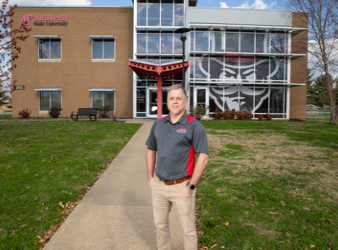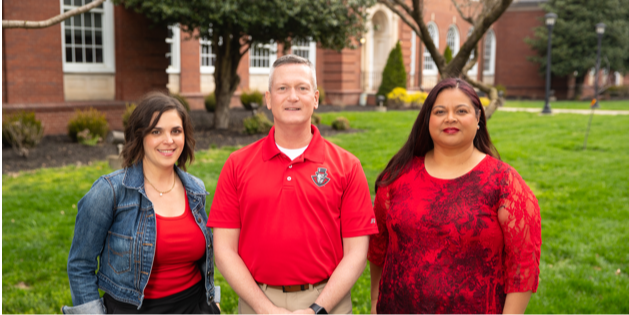Every higher education institution structures their military-affiliated services differently. There is no one-size-fits-all approach to structuring these roles and services. Some campuses are just building out their services. And like Austin Peay State University (APSU), some are reorganizing their military-affiliated services.
Creating One Division for Military-Affiliated Services
In mid 2023, a staffing change offered an opportunity for APSU to reconsider and restructure how they organize their military services staff. The opportunity would lead to creating an entire Military and Veterans Affairs Division.
APSU has 24 employees who are 100 percent focused on serving military-affiliated students.
Before APSU restructured their military services, there was one 'military advisor in residence' who reported to the president and the other campus employees worked across three divisions in the institution. APSU also has the Fort Campbell Center, a first of its kind facility on an active-duty installation, with about a half-dozen APSU employees staffed there.
Walt Lord, who served in the Army for 36 years and retired as a major general, is now the vice president for APSU's Military and Veterans Affairs Division. But before that role, he was the one who worked directly for the president as the military advisor in residence.
"We all had different bosses," Lord says comically.
Lord continues, "...our executive director at the Fort Campbell Center had an opportunity to go back into the government world and work at Fort Campbell. Sitting down with the president, we talked about how we might one, fill that role, but more importantly, leverage the opportunity. And in about an hour long meeting we crafted this plan to bring everything under one umbrella and our senior leadership team has supported that plan fully."
Within our military services we have a number of teams including headquarters (leadership team), the Newton Military Family Resource Center, the Fort Campbell Center, Veterans Education Benefits Office (VEBO), and Veterans Upward Bound (VUB). The new division, rather than treating each team as separate, broke the structure down into two branches.
Lord explains how the restructuring began, "Jasmin, who was our director for the Newton Military Family Resource Center, advanced to the assistant vice president role, Ben Drummond, who was director at the Fort Campbell Center, we've elevated him to executive director. And as President Licari and I were talking about how we would organize this new division, I saw Marisa's box hanging out there at Fort Campbell and said, 'you know I really need someone to do that kind of work for the whole division' and Marisa agreed and stepped up and has done a great job for us."

Ben Drummond in front of the Fort Campbell Center.
The division has created immense marketing and recruitment opportunities. Marisa Roberts, an APSU alum who grew up in a military family, is the director of marketing, recruitment, and communications for the Military and Veterans Affairs Division. She says having all the marketing for military-affiliated prospective students housed under one roof streamlines their recruitment voice, "...we were very siloed and now by creating this division, we're not, we're one voice speaking for this population, which I think is really important."
Taking student feedback into consideration for the various roles that the new division houses was a key factor in structuring the division. Staff kept track of the staffing resources that students were asking for and needed through focus groups. Jasmin Linares has been with Austin Peay State University for 17 years. After active duty, she served in the reserves and started working at APSU as a school certifying official in 2007. She is now the assistant vice president for the Military and Veteran Affairs Division. Based on student feedback, Linares explains, "We have a military affiliated student success professional...we also created the military affiliated career specialist position. Back before we became the division, that role was housed inside of career services. So, they also had other things to do. But as we moved the position over to us, now the focus of that role is completely on our military population."
Benefits of the New Division and Areas That Still Need to be Addressed
Before the Military and Veterans Affairs Division was created, the needs and successes of the Newton Military Family Resource Center rarely made it all the way through the many layers of leadership to reach the president. Linares shares that Lord, as the division VP, is now in bi-weekly meetings with the president representing military-affiliated students, "...officially as a division, the president of the university knows what we're doing."
With approximately 2,700 military-affiliated students, the advising caseload can become overwhelming, but within their new division and structure staff can support each other during peak advising periods, "we've done a lot of cross training...we've filled in for each other and reinforced each other in ways that we couldn't do before...the silos wouldn't allow it in the past," says Lord.
Lord says "...we're still finding some gaps in staffing and the budget. We're fixing those as we go."
Budgeting Under the Division
As all military-affiliated staff understand, metrics are a key part of building and maintaining budgets in higher ed. And departments do their utmost to keep their budgets and funding. Before the division, financial support for military services at APSU were broken into several budgets and obtaining the metrics to support those budgets were also broken up in different departments and offices. The transferring of all military services into one division means that APSU can pull metrics from one division and build a budget for themselves.
Departments in higher ed work very hard to maintain and keep their budgets, so as you can imagine, the transferring of various staff roles into the division did create some budget transferring bumps in the road.
When a role was transferred into the new division, the role would often be transferred with salary and benefits funding, some operations funding, but not always travel funding.
When talking through the transferring of roles and budgets, Linares points out, "I don't want people to think that it was that simple, that we take this here and we put it over here. It was not simple. You do have to be ready with justifications and have the support from the president and the administration on this."
Advice for Other Campuses
"...senior leader buy in, that's very, very important. One of our strengths was presentation that Jasmin and I gave to our Board of Trustees even before the decision was made to form this division," shares Lord.
The APSU Board of Trustees holds quarterly meetings, and every meeting has a campus spotlight. In March of 2023 the spotlight for the meeting was campus support for military affiliated students. The night before the meeting the team hosted dinner at the Newton Military Family Resource Center.
"It was a great environment to bring our trustees into and then the next morning at the meeting, Jasmin and I gave them a presentation on everything that I did as military advisor and everything she does here at the Newton Center. In preparation for that, I asked our student account services department to share with me the revenue that the school receives from VA education benefits, Army tuition assistance, Tennessee Strong, ROTC scholarships, and it was $18 million a year...it made a powerful impact on our trustees," shares Lord.
"So, if there's someone out there who is looking to advocate for a reorg like we've had, I would recommend that they find out what that revenue figure is and tell anybody who has the power to make that decision. It just makes good sense from a business perspective. It makes good sense to show that we're serious about taking care of these students and especially the veteran population."
Communicating Job Security
In any kind of reorganization there are going to be concerns about job security.
"Not only did we meet individually with certain people and answer their questions, but we also had our first division meeting within not even a month of coming together," Linares shares.
Linares has met with her entire team after the restructuring and individually asked them how they were feeling about the new division and roles, and stresses that communication and transparency are key to this kind of reorg, "...the more information you can give your team and the better prepared they are, and they feel part of the team, the better it is."
A new division means meeting new people and working with new roles, "...you have to be able to trust the staff that are in place because they are the subject matter expert. I think one of the new obstacles that we we've seen is learning what they do here, learning what they do at Fort Campbell, and trusting each other that we're going to be able to pick up whenever there's a hole to put our best foot forward," Roberts shares.
Through it all, "...stay focused on what the mission is," says Linares. And for the new Military and Veterans Affairs Division at APSU, that is serving the military-affiliated student.

